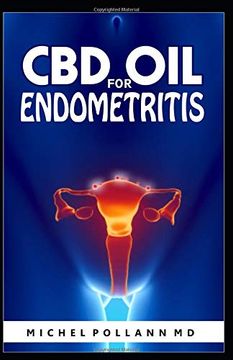Cbd oil for Endometritis: Permanent Remedy for Inflammation of the Endometrial Lining of the Uterus
Reseña del libro "Cbd oil for Endometritis: Permanent Remedy for Inflammation of the Endometrial Lining of the Uterus"
Endometritis is inflammation of the endometrial lining of the uterus. In addition to the endometrium, inflammation may involve the myometrium and, occasionally, the parametrium.Endometritis can be divided into pregnancy-related endometritis and endometritis unrelated to pregnancy. When the condition is unrelated to pregnancy, it is referred to as pelvic inflammatory disease (PID). Endometritis is often associated with inflammation of the fallopian tubes (salpingitis), ovaries (oophoritis), and pelvic peritoneum (pelvic peritonitis). PID is defined as any combination of endometritis, salpingitis, tubo-ovarian abscess, and pelvic peritonitis. The diagnosis of endometritis is usually based on clinical findings, such as fever and lower abdominal pain.Most cases of endometritis, including those following cesarean delivery, should be treated in an inpatient setting. For mild cases following vaginal delivery, oral antibiotics in an outpatient setting may be adequate.Infection of the endometrium, or decidua, usually results from an ascending infection from the lower genital tract. From a pathologic perspective, endometritis can be classified as acute versus chronic. Acute endometritis is characterized by the presence of neutrophils within the endometrial glands. Chronic endometritis is characterized by the presence of plasma cells and lymphocytes within the endometrial stroma.In the nonobstetric population, pelvic inflammatory disease and invasive gynecologic procedures are the most common precursors to acute endometritis. In the obstetric population, postpartum infection is the most common predecessor.Chronic endometritis in the obstetric population is usually associated with retained products of conception after delivery or elective abortion. In the nonobstetric population, chronic endometritis has been seen with infections (eg, chlamydia, tuberculosis, bacterial vaginosis) and the presence of an intrauterine device.The intrauterine device as a factor in the etiology of pelvic inflammatory disease was associated with early forms of the device, in particular, the Dalkon Shield. The incidence of pelvic inflammatory disease is not higher in users of modern intrauterine devices than in non-users.Endometritis is a polymicrobial disease involving, on average, 2-3 organisms. In most cases, it arises from an ascending infection from organisms found in the normal indigenous vaginal flora.Commonly isolated organisms include Ureaplasma urealyticum, Peptostreptococcus, Gardnerella vaginalis, Bacteroides bivius, and group B Streptococcus. Chlamydia has been associated with late-onset postpartum endometritis. Enterococcus is identified in up to 25% of women who have received cephalosporin prophylaxis.Herpes and tuberculosis are rare causes, although in some countries tuberculosis is not an uncommon etiologic agent.The incidence of postpartum endometritis in the United States varies depending on the route of delivery and the patient population. After a vaginal delivery, incidence is 1-3%. Following cesarean delivery, the incidence ranges from 13-90%, depending on the risk factors present and whether preoperative antibiotic prophylaxis had been given. In the non-obstetric population, concomitant endometritis may occur in up to 70-90% of documented cases of salpingitis.Nearly 90% of women treated with an approved regimen note improvement in 48-72 hours. Delay in initiation of antibiotic therapy can result in systemic toxicity.Endometritis is associated with increased maternal mortality due to septic shock. However, mortality is rare in the United States because of aggressive antimicrobial management.Get your copy now!

